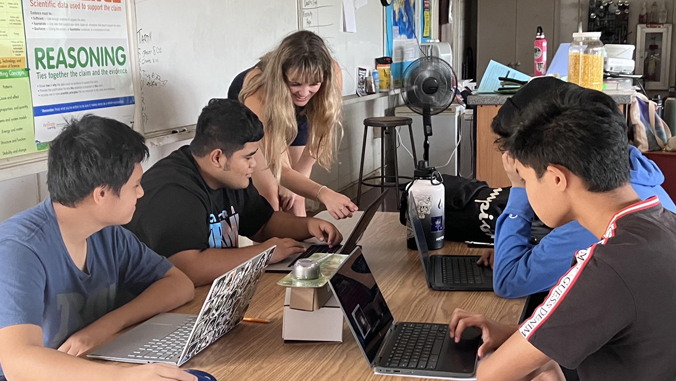
A new opportunity to support professional development opportunities and foster diversity and inclusion was launched within the University of Hawaiʻi at Mānoa School of Ocean and Earth Science and Technology (SOEST). A total of 16 projects were awarded funding for spring and summer 2024.
Catalyst Awards for Science Advancement (CASA) are small grants, up to $3,000, in three focus areas: technical training and holistic career development of female graduate students, staff, and faculty who are a part of Women-in-SOEST; advancing diversity, equity, inclusion (DEI) and/or fostering a Native Hawaiian place of learning in SOEST; and attracting and training the next generation of planetary explorer-scientists.

“It was amazing to see such innovative and impactful activities proposed,” said Barbara Bruno, CASA program director. “Many were collaborative, bringing together faculty, staff and students from across SOEST. It’s exciting to support such great projects.”
Supporting professional development
Women-in-SOEST members received support to conduct fieldwork and laboratory experiments, purchase equipment, attend workshops, present at national and international conferences, and develop new research collaborations. Fernanda Henderikx-Freitas traveled to University of California, Santa Barbara to learn a state-of-the-art technique to characterize oceanic particles, Emily Costello will present an invited talk at an upcoming astrobiology conference, and Juliana Peckenpaugh and Meryem Berrada enrolled in an online data science course.
“I’m incredibly thankful that the CASA funding will allow me to take a prestigious course in data science offered by Harvard University to boost my skills in this field and provide workshops to Women-in-SOEST members to ensure nobody gets left behind when it comes to programming and data science,” said Peckenpaugh, a SOEST graduate student.
Community, student outreach
All SOEST graduate students, faculty or staff members were eligible to apply for a grant to further DEI or conduct outreach to train the next generation of planetary science explorers. Funded projects also included outreach to community members and K-12 students in Hawaiʻi.
“I was so thankful for the CASA grant funding that allowed me to bring Graduate Women in Science volunteers to four high schools around the state of Hawaiʻi, as well as fund a visit from female students at Maryknoll High School to come and visit labs at UH Mānoa,” said Linnea Wolniewicz, a UH Mānoa computer and information sciences graduate student. “It was very special to be able to educate students on discovering exoplanets from a completely female cohort of scientists, and inspire young girls to attend college and study science.”
In addition, the CASA program requires funded projects to disseminate what they did or learned, creating a positive ripple effect wherein others can benefit from their experiences and knowledge gained.
For more information, see SOEST’s website.
–By Marcie Grabowski

